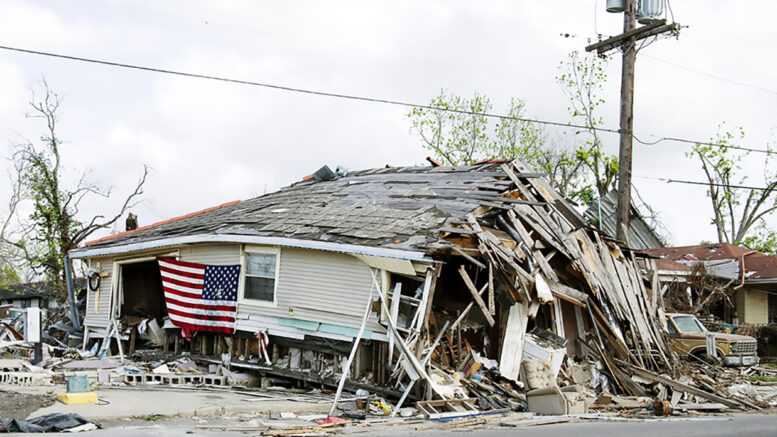By Claire Buri
As a European, I had no prior experience of hurricanes or what to do if one became a threat.
Before I came to Florida from Germany for a college exchange program, we had been told that hurricanes occur more frequently in the fall. We also knew, in theory, that the worst-case scenario could lead to an evacuation.
But hearing about natural disasters from afar is one thing—being affected and experiencing them yourself is quite another.
We had already gone through one scare with Hurricane Helene this fall, as it closed the Flagler College campus and brushed the area. But when Hurricane Milton started gaining steam in the Gulf of Mexico, eventually reaching the highest intensity a storm can achieve, it turned a normal Monday morning, with occasional yawns drifting through my “Intro to Short Story Writing” class, into one full of unease and chaos.
Earlier that morning, my professor said, “I have good friends in Tampa who were hit by the first storm. I pray for them,” giving us a faint premonition of what would happen that day.
As I entered the library that Monday, it was filled with hectic chaos; every other person I passed had their phone pressed to their ear, speaking into it in clear distress.
I sensed that something was seriously wrong, so I checked my emails.
When I received the news at 11:30 a.m. that we were no longer safe in Saint Augustine and had to evacuate from our dorms, I felt as if someone had pulled the rug out from under my feet.
As I looked around, I realized I wasn’t the only one feeling this way. People were talking over one another, rushing from one place to another. Some were sitting with open laptops, searching for flights. While some appeared calm, I noticed that others, like me, were on the verge of tears.
Later, I asked my friend how she experienced the day, and she said, “I remember that you were completely shaken.”
Even my parents, whom I called immediately out of pure instinct, were speechless.
My mother, apparently even more shocked than I was, responded, “What do you mean they’re kicking you out of your dorm? You have nowhere to go; they can’t just do that!”
In moments like these, you hope your parents will know what to do— reassure you, tell you it’s going to be okay, and help. But my parents had no experience with natural disasters, and from over 4,000 miles away, they couldn’t help me even if they wanted to.
The idea of having to leave my home here in the next 24 hours scared me. It wasn’t just that I didn’t know where to go, being an international student with no home in the U.S. apart from my dorm. It was also the uncertainty of what would happen next and when, or if, I would be able to go back, which weighed heavily on me. The only option we were given was to stay in one of the shelters in St. Augustine— an option I wanted to avoid at all costs.
Hoping to find somewhere to go, I started calling people to see what my friends were up to. Most of them flew home. Others had no plans themselves.
After a few calls, I found a friend who offered me and another German to come home with her. The only catch was that she lives in Pennsylvania. The flights were either fully booked or overpriced, and there was no way to be sure that the flight wouldn’t be canceled. The only option left was to drive up the coast by car.
We only had a few hours to leave our dorms before the long journey ahead of us, so we headed north that same evening.
During the 23-hour drive, more and more messages arrived on my phone from friends and family asking how I was doing. That was when I recognized Milton had now even made it to Germany.
One of my friends from home sent me a video from the American news, where the mayor of Tampa said, “Those who stay, die,” with the message, “I’m worried,” texted underneath.
Shortly after, I saw a meteorologist from the American channel NBC6 fighting back tears as he tried to explain the extent of the storm.
It wasn’t just my friends who were worried; I was too. I had to think about the words of my English professor. I saw videos of people desperately trying to drive over a bridge that was already filled with water. Videos of people’s houses collapsing. And this time, it wasn’t a distant disaster; it happened right next to me.
When I heard that we could return to the college and nothing major had been damaged by the hurricane, all of the pent-up tension of the past few days suddenly left my body. For the first time in three days, I felt like I could truly exhale.
I am aware that the experience of witnessing a hurricane up close will likely remain unique for me as a European. After feeling the uncertainty firsthand, I appreciate even more that I’ve never had to fear for my home in Germany.
At the same time, however, the hurricane lingers as a dark shadow in my mind, as natural disasters are intensifying due to climate change.
In my opinion, it’s only a matter of time before Germany, too, could be affected more frequently by natural disasters.




Be the first to comment on "Facing the Storm: A European Student’s Encounter with a Hurricane in Florida"